During Dormancy: Garden Maintenance in Winter

Though mild in some states, winter in Australia can offer a unique opportunity to tend to your garden with the right care through to summer. Here in the Blue Mountains, we face a colder and more frost prone winter. As the vibrant hues of spring and summer fade into the quiet dormancy of winter, this is the perfect time to prepare your garden for the coming seasons, and ensure the health of your beloved plants and trees.
Here’s how you can make the most of this restful period…
Understanding Winter Dormancy
Plants enter a state of dormancy during winter, significantly slowing down their growth to conserve energy; this natural process is crucial for their survival and future productivity. While the garden may seem still and inactive, some essential processes are at work beneath the surface. Your role as a gardener is to support these processes through proper maintenance.
Pruning and Trimming
Winter is an ideal time to prune deciduous trees and shrubs. With the absence of leaves, you have a clear view of the plant’s structure, making it easier to remove dead or diseased branches. Pruning encourages new growth in spring and helps maintain the plant’s shape. It’s always best to bear in mind the different techniques for each plant, tree, or shrub – so make sure to do your research online before you give them a trim.
As a general rule of thumb-
- Tools: Use clean, sharp pruning shears to make precise cuts.
- Technique: Cut at a 45-degree angle, just above a bud that is facing outward.
Soil Care
Healthy soil is the foundation of a healthy garden. Winter is a great time to replenish nutrients and improve soil structure. Here’s a couple of ways to replenish the ground during this time-
- Composting: Add compost to your garden beds to enrich the soil. Organic matter breaks down slowly during winter, ready to nourish plants in spring.
- Mulching: Apply a layer of mulch to protect the soil from erosion and temperature fluctuations. Mulch also helps retain moisture and suppresses weeds. Make sure you choose a good quality mulch for health of the soil, as well as your plants for healthy future blooms.
Protecting Plants
Some plants may need extra protection from the cold, such as-
- Frost Protection: Use frost cloths or hessian sacks to cover delicate plants during particularly cold nights.
- Wind Barriers: Erect windbreaks using shade cloth or plant evergreen shrubs to shield sensitive plants from harsh winds.

Maintenance of Tools and Infrastructure
Winter is a good time to clean, repair, and sharpen your gardening tools. Well-maintained tools make gardening tasks easier and more efficient.
- Cleaning: Remove soil and sap from tools to prevent rust and prolong their lifespan.
- Sharpening: Sharpen blades to ensure clean cuts, reducing the risk of plant damage.
Planning for Spring
Use the quieter winter months to plan for the upcoming growing season. Assess what worked well in your garden and what didn’t. Sketch out new designs, research plant varieties, and order seeds.
- Garden Journal: Keep a journal to record observations, ideas, and plans. This helps you stay organized and track your garden’s progress over the years.
- Seed Ordering: Order seeds early to ensure you have the varieties you want when it’s time to plant.
Wildlife Considerations
Winter can be tough for wildlife, providing food and shelter can help support local biodiversity.
- Bird Feeders: Set up bird feeders and keep them stocked with seed. Birds help control pests and pollinate plants.
- Habitat: Leave some garden areas undisturbed as habitat for insects and small animals. Piles of leaves, logs, and rocks provide shelter.

Enjoy the Quiet
Lastly, take the time to enjoy the tranquility of your winter garden. The Blue Mountains offer stunning winter landscapes, and your garden can be a beautiful and peaceful retreat.
Winter gardening in the Blue Mountains is a blend of maintenance, protection, and planning. By tending to your garden during dormancy, you ensure that it remains healthy and vibrant, ready to burst into life when spring arrives. Embrace the stillness of winter and use it to nurture and prepare your garden for the seasons to come.
Written by Ellie, Everclear Gardens.
Subscribe for more lawn and garden tips below.






